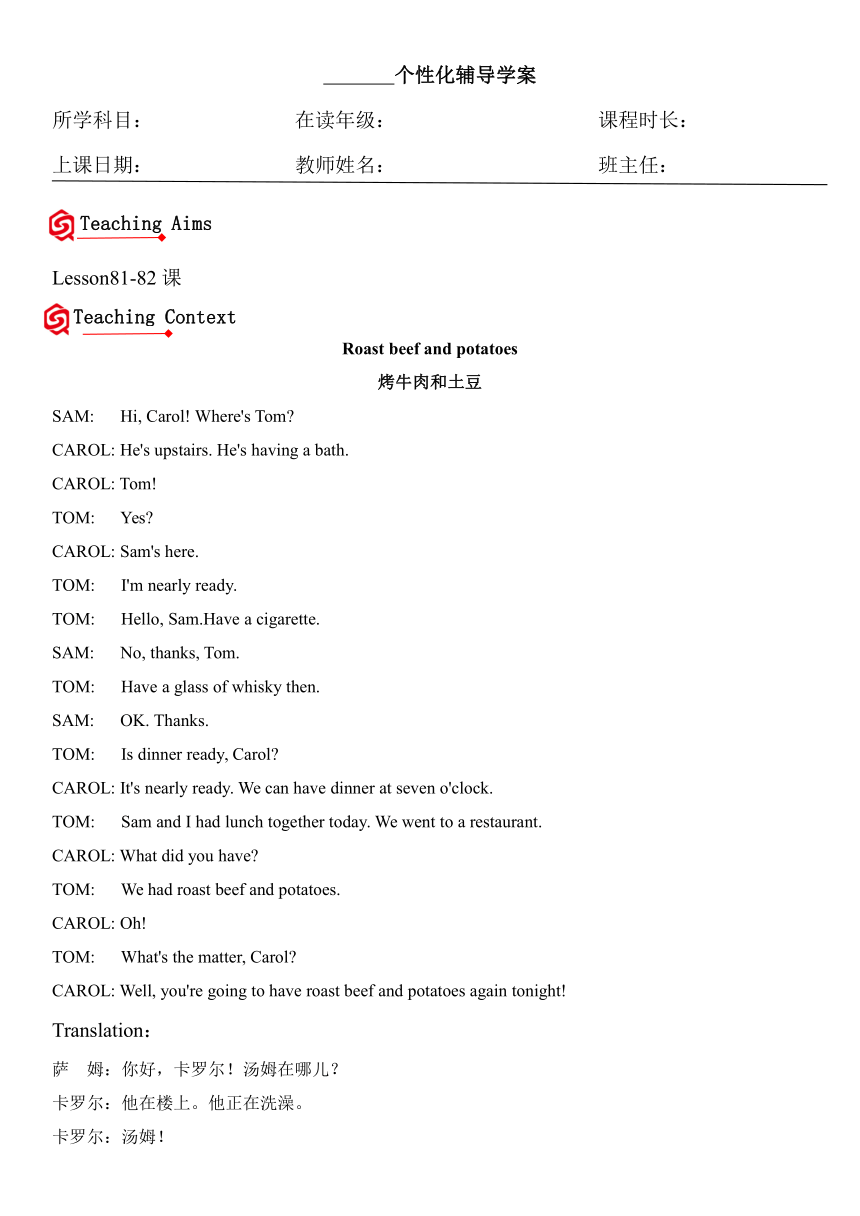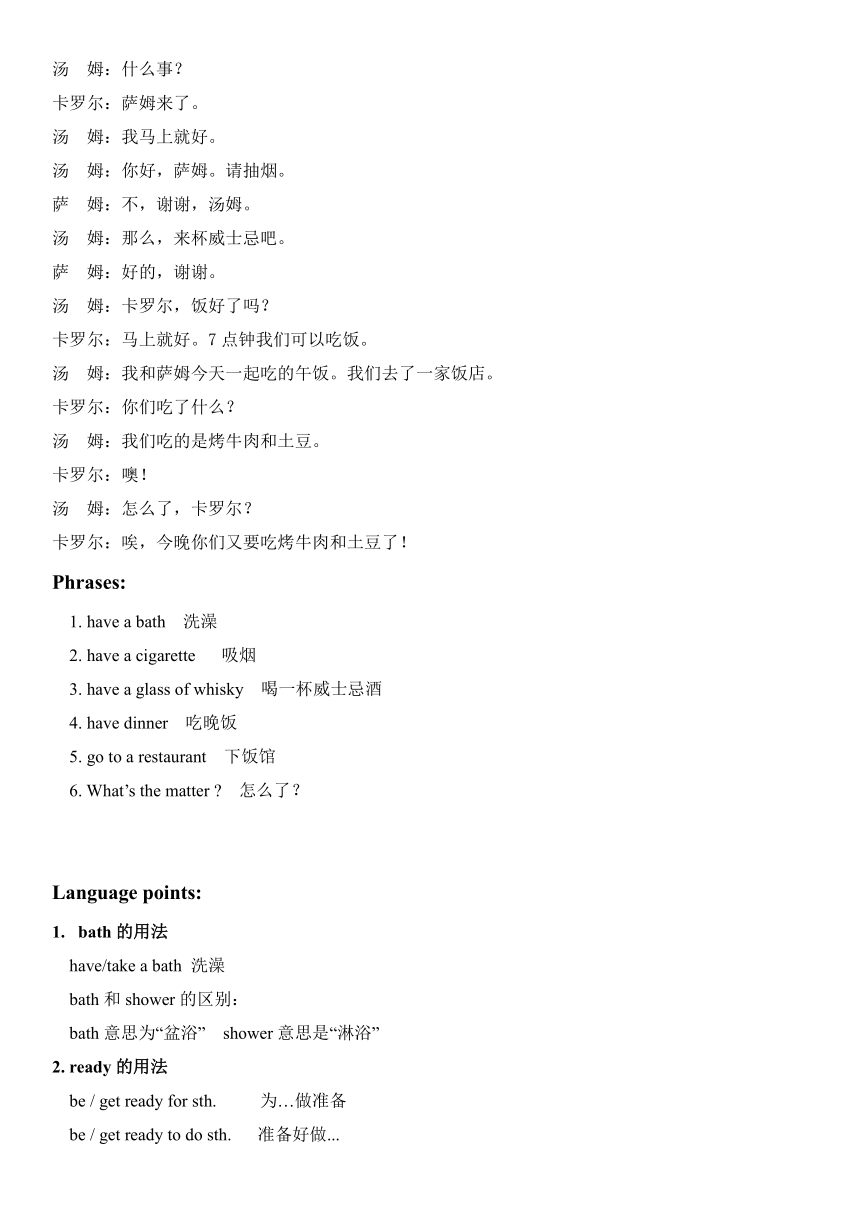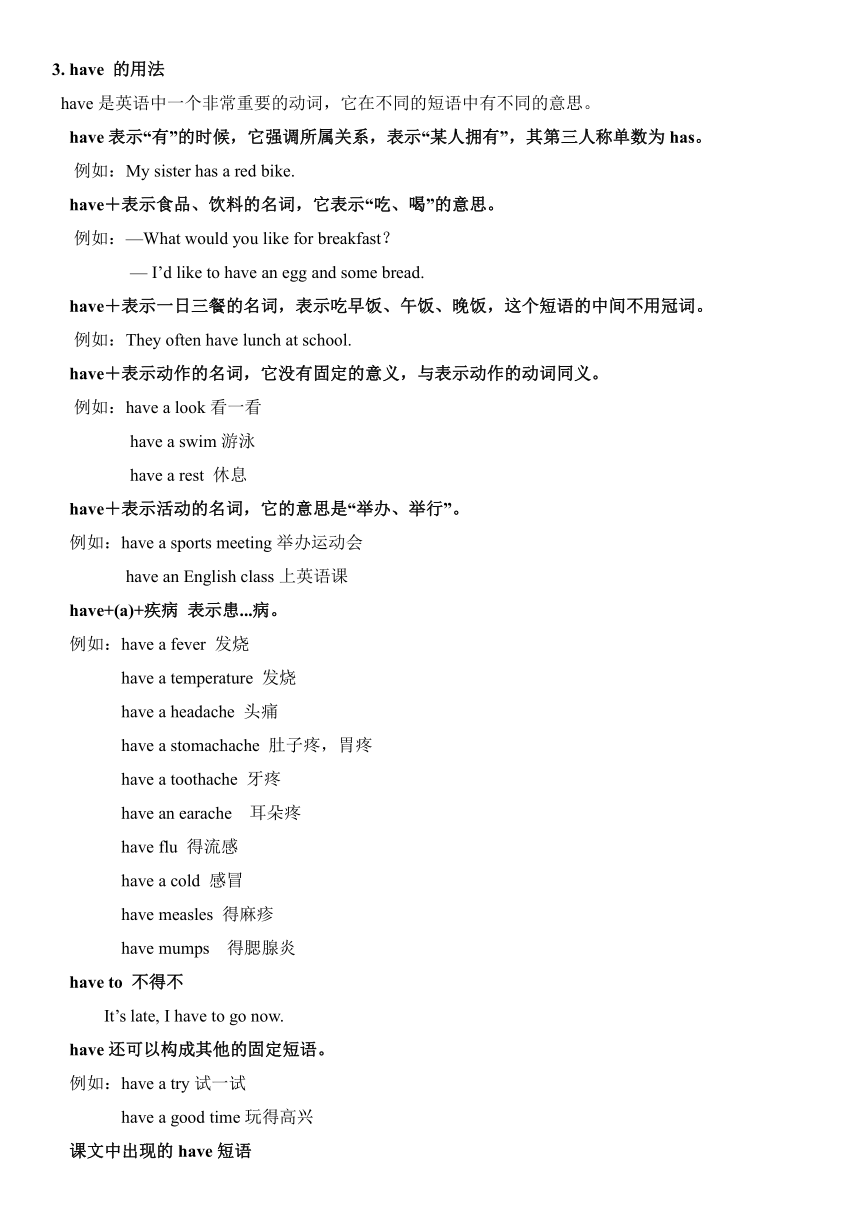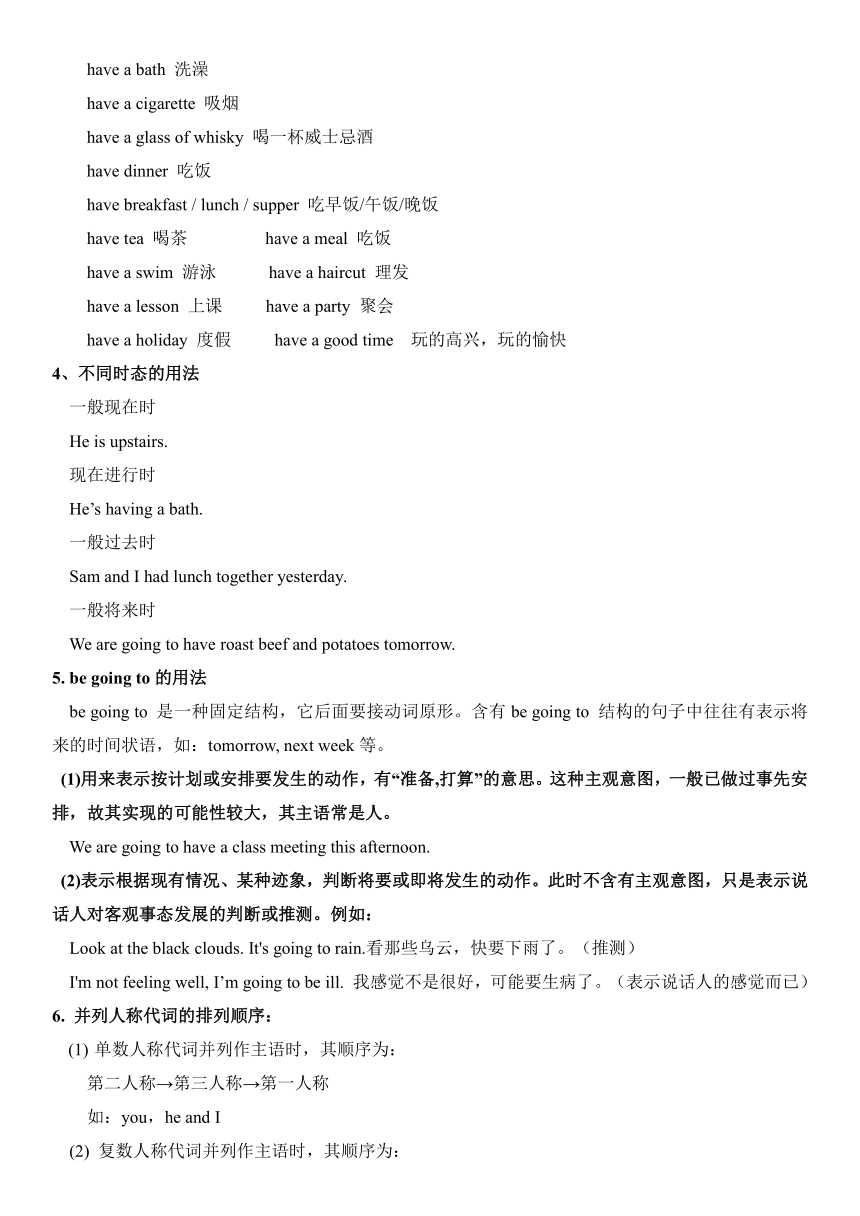新概念第一册81-82课导学案(无答案)
文档属性
| 名称 | 新概念第一册81-82课导学案(无答案) |  | |
| 格式 | docx | ||
| 文件大小 | 61.3KB | ||
| 资源类型 | 教案 | ||
| 版本资源 | 新概念英语 | ||
| 科目 | 英语 | ||
| 更新时间 | 2023-12-25 22:15:37 | ||
图片预览




文档简介
个性化辅导学案
所学科目: 在读年级: 课程时长:
上课日期: 教师姓名: 班主任:
Lesson81-82课
Roast beef and potatoes
烤牛肉和土豆
SAM: Hi, Carol! Where's Tom
CAROL: He's upstairs. He's having a bath.
CAROL: Tom!
TOM: Yes
CAROL: Sam's here.
TOM: I'm nearly ready.
TOM: Hello, Sam.Have a cigarette.
SAM: No, thanks, Tom.
TOM: Have a glass of whisky then.
SAM: OK. Thanks.
TOM: Is dinner ready, Carol
CAROL: It's nearly ready. We can have dinner at seven o'clock.
TOM: Sam and I had lunch together today. We went to a restaurant.
CAROL: What did you have
TOM: We had roast beef and potatoes.
CAROL: Oh!
TOM: What's the matter, Carol
CAROL: Well, you're going to have roast beef and potatoes again tonight!
Translation:
萨 姆:你好,卡罗尔!汤姆在哪儿?
卡罗尔:他在楼上。他正在洗澡。
卡罗尔:汤姆!
汤 姆:什么事?
卡罗尔:萨姆来了。
汤 姆:我马上就好。
汤 姆:你好,萨姆。请抽烟。
萨 姆:不,谢谢,汤姆。
汤 姆:那么,来杯威士忌吧。
萨 姆:好的,谢谢。
汤 姆:卡罗尔,饭好了吗?
卡罗尔:马上就好。7点钟我们可以吃饭。
汤 姆:我和萨姆今天一起吃的午饭。我们去了一家饭店。
卡罗尔:你们吃了什么?
汤 姆:我们吃的是烤牛肉和土豆。
卡罗尔:噢!
汤 姆:怎么了,卡罗尔?
卡罗尔:唉,今晚你们又要吃烤牛肉和土豆了!
Phrases:
1. have a bath 洗澡
2. have a cigarette 吸烟
3. have a glass of whisky 喝一杯威士忌酒
4. have dinner 吃晚饭
5. go to a restaurant 下饭馆
6. What’s the matter 怎么了?
Language points:
bath的用法
have/take a bath 洗澡
bath和shower的区别:
bath意思为“盆浴” shower意思是“淋浴”
2. ready的用法
be / get ready for sth. 为…做准备
be / get ready to do sth. 准备好做...
3. have 的用法
have是英语中一个非常重要的动词,它在不同的短语中有不同的意思。
have表示“有”的时候,它强调所属关系,表示“某人拥有”,其第三人称单数为has。
例如:My sister has a red bike.
have+表示食品、饮料的名词,它表示“吃、喝”的意思。
例如:—What would you like for breakfast?
— I’d like to have an egg and some bread.
have+表示一日三餐的名词,表示吃早饭、午饭、晚饭,这个短语的中间不用冠词。
例如:They often have lunch at school.
have+表示动作的名词,它没有固定的意义,与表示动作的动词同义。
例如:have a look 看一看
have a swim 游泳
have a rest 休息
have+表示活动的名词,它的意思是“举办、举行”。
例如:have a sports meeting 举办运动会
have an English class 上英语课
have+(a)+疾病 表示患...病。
例如:have a fever 发烧
have a temperature 发烧
have a headache 头痛
have a stomachache 肚子疼,胃疼
have a toothache 牙疼
have an earache 耳朵疼
have flu 得流感
have a cold 感冒
have measles 得麻疹
have mumps 得腮腺炎
have to 不得不
It’s late, I have to go now.
have还可以构成其他的固定短语。
例如:have a try 试一试
have a good time 玩得高兴
课文中出现的have短语
have a bath 洗澡
have a cigarette 吸烟
have a glass of whisky 喝一杯威士忌酒
have dinner 吃饭
have breakfast / lunch / supper 吃早饭/午饭/晚饭
have tea 喝茶 have a meal 吃饭
have a swim 游泳 have a haircut 理发
have a lesson 上课 have a party 聚会
have a holiday 度假 have a good time 玩的高兴,玩的愉快
4、不同时态的用法
一般现在时
He is upstairs.
现在进行时
He’s having a bath.
一般过去时
Sam and I had lunch together yesterday.
一般将来时
We are going to have roast beef and potatoes tomorrow.
5. be going to的用法
be going to 是一种固定结构,它后面要接动词原形。含有be going to 结构的句子中往往有表示将来的时间状语,如:tomorrow, next week等。
(1)用来表示按计划或安排要发生的动作,有“准备,打算”的意思。这种主观意图,一般已做过事先安排,故其实现的可能性较大,其主语常是人。
We are going to have a class meeting this afternoon.
(2)表示根据现有情况、某种迹象,判断将要或即将发生的动作。此时不含有主观意图,只是表示说话人对客观事态发展的判断或推测。例如:
Look at the black clouds. It's going to rain.看那些乌云,快要下雨了。(推测)
I'm not feeling well, I’m going to be ill. 我感觉不是很好,可能要生病了。(表示说话人的感觉而已)
6. 并列人称代词的排列顺序:
单数人称代词并列作主语时,其顺序为:
第二人称→第三人称→第一人称
如:you,he and I
(2) 复数人称代词并列作主语时,其顺序为:
第一人称→第二人称→第三人称
We,you and they
★注意:如果是做错事,承担责任时,说话的人把 I 放在第一位。
Who broke the window?谁打碎了玻璃?
I and Jack did.
一 单词拼写
1.洗澡 2.烤
3.在楼上 4.几乎,将近
5.假日 6.威士忌
7.准备好的 8.香烟
9.午餐 10.晚餐
二 单项选择:
-What are you doing, Carol
-I_____dinner with my friends.
have B. having C. am having D. will have
It is too hot today, I need to take a ____.
show B. shower C. showing D. showed
3.--What did you have for lunch
--We _____ roast beef and potatoes.
had B. have C. has D. having
“我马上就好” in English is______.
I’m ready nearly B. I’m nearly ready C. Nearly I’m ready
You can________some tea________four o'clock in the afternoon.
drink; on B. have; on C. have; at D. had; at
6.--What's the matter your bike
--It’s broken.
A. for B. with C. in D. on
7.We_____to a restaurant yesterday.
go B. went C. goed D. goes
8.What about having ________whisky
a B. an C. a glass D. a glass of
9.We can_____dinner at 7 o’clock.
have B. has C. had D. having
10.--Where do you usually have lunch
--In a_____.
home B. restaurant C. station D. book shop
11.People ____ very often in summer.
take showers B. take bath C. take shower D. showers
12.Linda didn’t have breakfast this morning ____she got up too late.
because B. so C. or D. and
13.I’m ready______breakfast.
to B. for C. at D. about
14.--____ Tom ____ a haircut last week
--Yes, he ____.
A. Did; have; did B. Do; has; does C. Does; have; does D. Did; has; do
5. --What is she going to do this afternoon
--She is going to______a lesson.
do B. does C. have D. had
6.--Did you have a holiday last year
--___________.We had no time.
Yes, I did B. Yes, we didn’t C. No, we did D. No, we didn’t
--Who called me ten minutes ago
--Jack____.
is B. was C. does D. did
8.--Where your brother
--He is .
A. are; upstairs B. is; stair C. is; upstairs D. are; upstair
9.--How was your weekend
-We____for a walk by the lake.
go B. going C. went D. goes
10.--It is hot. a glass of water, please.
--Thank you.
A. Have B. Make C. Give D. Take
11.Mary often has________lunch at school.
A. a B. an C. the D. /
12.Are you ready______go to school
at B. for C. to D. about
13.Jenny______have lunch at home because her mother was out.
did B. didn’t C. doesn’t D. does
14.The students________ English classes now.
A. have B. having C. is having D. are having
15.They must_____a meal tonight.
cook B. cooked C. cooking D. is cooking
16.Lily _______yesterday.
A. go shopping B. goes shopping C. went shop D. went shopping
17.--What you
--We had beef and potatoes.
A. did; have B.do; has C. did; has D. are; having
18.--What are you going to do at the weekend
--We_______ a picnic by the lake.
is going to have B. will have C. have D. having
19.--Please have some cookies.
--_______.
Sorry B. No C. Thank you D. Not at all
20.I’d like some______and_______.
beefs; potatoes B. beef; potatos C. beef; potatoes D. beefs; potatoes
21.We can dinner six o'clock.
A. have;in B. has;at C. had;in D. have;at
22.Yesterday afternoon I got home .
A. late B. lately C. later D. slow
23. your coat. It's snowing outside.
A. Wear B. Dress C. Put on D. Dress up
24.There are people in the street on Sunday.
A. lot of B. much C. a lot of D. a lot
25.She hasn't got any money. I've not got much, .
A. too B. either C. or D. also
26.There______any bread on the table yesterday.
is B. was C. were D. wasn’t
27. Jack is an American boy, but he can______Chinese.
speak B. tell C. say D. talk
28. Can you tell me the way_____King Street
A. in B. on C. at D. to
29.--What's in the cupboard
--Some ,but no .
A. apples; coffee B. coffees; apple C. apple; coffee D. coffees; apples
30. --There have been a lot of vegetables in our home. You needn't go to the_____.
--OK.
grocer's B. stationer's C. greengrocer's D. butcher's
三 阅读
A friend’s grandfather came to America from Britain. He went into a cafeteria in lower Manhattan to get something to eat. He sat down at an employ table and waited for someone to take his order. Of course nobody did. At last, a woman with a plate full of food sat down in front of him and told him how a cafeteria worked. “Start out at the end.” she said, “Just go along the line and pick out whatever you want. At the other end they’ll tell you how much you have to pay.”
“I soon learned that’s how everything works in America,” the grandfather told a friend. “Life is like a cafeteria here. You can get anything you want only if you like to pay the money. You can even get success, but you’ll never get it if you wait for someone to bring it to you. You have to get up and get it yourself.”
( a )1.The old man was _____.
A. English B. American C. Germany
( a )2. “Take his order” here means _____.
A. have some food booked B. put everything in order C. take his turn
( c )3. Which of the following sentences is true
A. There was nobody eating in the cafeteria B. The woman is a friend of that man
C. The old man hadn’t been to a cafeteria before
( c )4. From this story ,we know if you want to get success in America, you should___.
A. take your order B. know how a cafeteria works
C. try to get everything by yourself
( b )5. The best title of the story is _____.
A. From Britain to America B. Life is Like a Cafeteria in America
C. Eating in an American Cafeteria
四 连词成句
1.not have can dinner seven we at o’clock yet
we can not have dinner at seven o'clock yet
2. like I very it much well
I like it very much
3. will have what we
What we will have
4. Carol dinner is ready yet
Is dinner ready yet, Carol
5. we going potatoes have to are beef and today again roast
We are going to have beef and potatoes today again.
五 翻译
1. 我喜欢吃烤土豆和牛肉。
2. 请抽支烟吧。
3. 今天我和张艺谋一起吃了中午饭。
4. 你多长时间洗一次澡。
5. 我们七点钟开始吃晚饭。
本节课主要学习了第81--82课的词汇,短语和句子,重点学习了单词have和be going to表将来时的用法,复习了一般现在时,一般过去时,提高了学生对本节重点内容的运用能力。
所学科目: 在读年级: 课程时长:
上课日期: 教师姓名: 班主任:
Lesson81-82课
Roast beef and potatoes
烤牛肉和土豆
SAM: Hi, Carol! Where's Tom
CAROL: He's upstairs. He's having a bath.
CAROL: Tom!
TOM: Yes
CAROL: Sam's here.
TOM: I'm nearly ready.
TOM: Hello, Sam.Have a cigarette.
SAM: No, thanks, Tom.
TOM: Have a glass of whisky then.
SAM: OK. Thanks.
TOM: Is dinner ready, Carol
CAROL: It's nearly ready. We can have dinner at seven o'clock.
TOM: Sam and I had lunch together today. We went to a restaurant.
CAROL: What did you have
TOM: We had roast beef and potatoes.
CAROL: Oh!
TOM: What's the matter, Carol
CAROL: Well, you're going to have roast beef and potatoes again tonight!
Translation:
萨 姆:你好,卡罗尔!汤姆在哪儿?
卡罗尔:他在楼上。他正在洗澡。
卡罗尔:汤姆!
汤 姆:什么事?
卡罗尔:萨姆来了。
汤 姆:我马上就好。
汤 姆:你好,萨姆。请抽烟。
萨 姆:不,谢谢,汤姆。
汤 姆:那么,来杯威士忌吧。
萨 姆:好的,谢谢。
汤 姆:卡罗尔,饭好了吗?
卡罗尔:马上就好。7点钟我们可以吃饭。
汤 姆:我和萨姆今天一起吃的午饭。我们去了一家饭店。
卡罗尔:你们吃了什么?
汤 姆:我们吃的是烤牛肉和土豆。
卡罗尔:噢!
汤 姆:怎么了,卡罗尔?
卡罗尔:唉,今晚你们又要吃烤牛肉和土豆了!
Phrases:
1. have a bath 洗澡
2. have a cigarette 吸烟
3. have a glass of whisky 喝一杯威士忌酒
4. have dinner 吃晚饭
5. go to a restaurant 下饭馆
6. What’s the matter 怎么了?
Language points:
bath的用法
have/take a bath 洗澡
bath和shower的区别:
bath意思为“盆浴” shower意思是“淋浴”
2. ready的用法
be / get ready for sth. 为…做准备
be / get ready to do sth. 准备好做...
3. have 的用法
have是英语中一个非常重要的动词,它在不同的短语中有不同的意思。
have表示“有”的时候,它强调所属关系,表示“某人拥有”,其第三人称单数为has。
例如:My sister has a red bike.
have+表示食品、饮料的名词,它表示“吃、喝”的意思。
例如:—What would you like for breakfast?
— I’d like to have an egg and some bread.
have+表示一日三餐的名词,表示吃早饭、午饭、晚饭,这个短语的中间不用冠词。
例如:They often have lunch at school.
have+表示动作的名词,它没有固定的意义,与表示动作的动词同义。
例如:have a look 看一看
have a swim 游泳
have a rest 休息
have+表示活动的名词,它的意思是“举办、举行”。
例如:have a sports meeting 举办运动会
have an English class 上英语课
have+(a)+疾病 表示患...病。
例如:have a fever 发烧
have a temperature 发烧
have a headache 头痛
have a stomachache 肚子疼,胃疼
have a toothache 牙疼
have an earache 耳朵疼
have flu 得流感
have a cold 感冒
have measles 得麻疹
have mumps 得腮腺炎
have to 不得不
It’s late, I have to go now.
have还可以构成其他的固定短语。
例如:have a try 试一试
have a good time 玩得高兴
课文中出现的have短语
have a bath 洗澡
have a cigarette 吸烟
have a glass of whisky 喝一杯威士忌酒
have dinner 吃饭
have breakfast / lunch / supper 吃早饭/午饭/晚饭
have tea 喝茶 have a meal 吃饭
have a swim 游泳 have a haircut 理发
have a lesson 上课 have a party 聚会
have a holiday 度假 have a good time 玩的高兴,玩的愉快
4、不同时态的用法
一般现在时
He is upstairs.
现在进行时
He’s having a bath.
一般过去时
Sam and I had lunch together yesterday.
一般将来时
We are going to have roast beef and potatoes tomorrow.
5. be going to的用法
be going to 是一种固定结构,它后面要接动词原形。含有be going to 结构的句子中往往有表示将来的时间状语,如:tomorrow, next week等。
(1)用来表示按计划或安排要发生的动作,有“准备,打算”的意思。这种主观意图,一般已做过事先安排,故其实现的可能性较大,其主语常是人。
We are going to have a class meeting this afternoon.
(2)表示根据现有情况、某种迹象,判断将要或即将发生的动作。此时不含有主观意图,只是表示说话人对客观事态发展的判断或推测。例如:
Look at the black clouds. It's going to rain.看那些乌云,快要下雨了。(推测)
I'm not feeling well, I’m going to be ill. 我感觉不是很好,可能要生病了。(表示说话人的感觉而已)
6. 并列人称代词的排列顺序:
单数人称代词并列作主语时,其顺序为:
第二人称→第三人称→第一人称
如:you,he and I
(2) 复数人称代词并列作主语时,其顺序为:
第一人称→第二人称→第三人称
We,you and they
★注意:如果是做错事,承担责任时,说话的人把 I 放在第一位。
Who broke the window?谁打碎了玻璃?
I and Jack did.
一 单词拼写
1.洗澡 2.烤
3.在楼上 4.几乎,将近
5.假日 6.威士忌
7.准备好的 8.香烟
9.午餐 10.晚餐
二 单项选择:
-What are you doing, Carol
-I_____dinner with my friends.
have B. having C. am having D. will have
It is too hot today, I need to take a ____.
show B. shower C. showing D. showed
3.--What did you have for lunch
--We _____ roast beef and potatoes.
had B. have C. has D. having
“我马上就好” in English is______.
I’m ready nearly B. I’m nearly ready C. Nearly I’m ready
You can________some tea________four o'clock in the afternoon.
drink; on B. have; on C. have; at D. had; at
6.--What's the matter your bike
--It’s broken.
A. for B. with C. in D. on
7.We_____to a restaurant yesterday.
go B. went C. goed D. goes
8.What about having ________whisky
a B. an C. a glass D. a glass of
9.We can_____dinner at 7 o’clock.
have B. has C. had D. having
10.--Where do you usually have lunch
--In a_____.
home B. restaurant C. station D. book shop
11.People ____ very often in summer.
take showers B. take bath C. take shower D. showers
12.Linda didn’t have breakfast this morning ____she got up too late.
because B. so C. or D. and
13.I’m ready______breakfast.
to B. for C. at D. about
14.--____ Tom ____ a haircut last week
--Yes, he ____.
A. Did; have; did B. Do; has; does C. Does; have; does D. Did; has; do
5. --What is she going to do this afternoon
--She is going to______a lesson.
do B. does C. have D. had
6.--Did you have a holiday last year
--___________.We had no time.
Yes, I did B. Yes, we didn’t C. No, we did D. No, we didn’t
--Who called me ten minutes ago
--Jack____.
is B. was C. does D. did
8.--Where your brother
--He is .
A. are; upstairs B. is; stair C. is; upstairs D. are; upstair
9.--How was your weekend
-We____for a walk by the lake.
go B. going C. went D. goes
10.--It is hot. a glass of water, please.
--Thank you.
A. Have B. Make C. Give D. Take
11.Mary often has________lunch at school.
A. a B. an C. the D. /
12.Are you ready______go to school
at B. for C. to D. about
13.Jenny______have lunch at home because her mother was out.
did B. didn’t C. doesn’t D. does
14.The students________ English classes now.
A. have B. having C. is having D. are having
15.They must_____a meal tonight.
cook B. cooked C. cooking D. is cooking
16.Lily _______yesterday.
A. go shopping B. goes shopping C. went shop D. went shopping
17.--What you
--We had beef and potatoes.
A. did; have B.do; has C. did; has D. are; having
18.--What are you going to do at the weekend
--We_______ a picnic by the lake.
is going to have B. will have C. have D. having
19.--Please have some cookies.
--_______.
Sorry B. No C. Thank you D. Not at all
20.I’d like some______and_______.
beefs; potatoes B. beef; potatos C. beef; potatoes D. beefs; potatoes
21.We can dinner six o'clock.
A. have;in B. has;at C. had;in D. have;at
22.Yesterday afternoon I got home .
A. late B. lately C. later D. slow
23. your coat. It's snowing outside.
A. Wear B. Dress C. Put on D. Dress up
24.There are people in the street on Sunday.
A. lot of B. much C. a lot of D. a lot
25.She hasn't got any money. I've not got much, .
A. too B. either C. or D. also
26.There______any bread on the table yesterday.
is B. was C. were D. wasn’t
27. Jack is an American boy, but he can______Chinese.
speak B. tell C. say D. talk
28. Can you tell me the way_____King Street
A. in B. on C. at D. to
29.--What's in the cupboard
--Some ,but no .
A. apples; coffee B. coffees; apple C. apple; coffee D. coffees; apples
30. --There have been a lot of vegetables in our home. You needn't go to the_____.
--OK.
grocer's B. stationer's C. greengrocer's D. butcher's
三 阅读
A friend’s grandfather came to America from Britain. He went into a cafeteria in lower Manhattan to get something to eat. He sat down at an employ table and waited for someone to take his order. Of course nobody did. At last, a woman with a plate full of food sat down in front of him and told him how a cafeteria worked. “Start out at the end.” she said, “Just go along the line and pick out whatever you want. At the other end they’ll tell you how much you have to pay.”
“I soon learned that’s how everything works in America,” the grandfather told a friend. “Life is like a cafeteria here. You can get anything you want only if you like to pay the money. You can even get success, but you’ll never get it if you wait for someone to bring it to you. You have to get up and get it yourself.”
( a )1.The old man was _____.
A. English B. American C. Germany
( a )2. “Take his order” here means _____.
A. have some food booked B. put everything in order C. take his turn
( c )3. Which of the following sentences is true
A. There was nobody eating in the cafeteria B. The woman is a friend of that man
C. The old man hadn’t been to a cafeteria before
( c )4. From this story ,we know if you want to get success in America, you should___.
A. take your order B. know how a cafeteria works
C. try to get everything by yourself
( b )5. The best title of the story is _____.
A. From Britain to America B. Life is Like a Cafeteria in America
C. Eating in an American Cafeteria
四 连词成句
1.not have can dinner seven we at o’clock yet
we can not have dinner at seven o'clock yet
2. like I very it much well
I like it very much
3. will have what we
What we will have
4. Carol dinner is ready yet
Is dinner ready yet, Carol
5. we going potatoes have to are beef and today again roast
We are going to have beef and potatoes today again.
五 翻译
1. 我喜欢吃烤土豆和牛肉。
2. 请抽支烟吧。
3. 今天我和张艺谋一起吃了中午饭。
4. 你多长时间洗一次澡。
5. 我们七点钟开始吃晚饭。
本节课主要学习了第81--82课的词汇,短语和句子,重点学习了单词have和be going to表将来时的用法,复习了一般现在时,一般过去时,提高了学生对本节重点内容的运用能力。
同课章节目录
